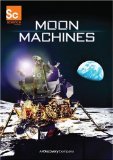| Reviews & Columns |
|
Reviews DVD TV on DVD Blu-ray 4K UHD International DVDs In Theaters Reviews by Studio Video Games Features Collector Series DVDs Easter Egg Database Interviews DVD Talk Radio Feature Articles Columns Anime Talk DVD Savant Horror DVDs The M.O.D. Squad Art House HD Talk Silent DVD
|
DVD Talk Forum |
|
|
| Resources |
|
DVD Price Search Customer Service #'s RCE Info Links |
|
Columns
|
|
|
Moon Machines
Just in time for the 40th anniversary of the Apollo 11 moon landing next week, The Discovery Channel and Image Entertainment have released the documentary mini-series Moon Machines, originally broadcast on the Discovery offshoot The Science Channel last summer. This six-part series details the monumental engineering challenges faced by the Apollo program as those involved moved toward the ultimate goal of landing on the moon. Each episode focuses on a specific topic, such as the multistage Saturn V rockets or the lunar rover, recounting the development of this incredible machinery through interviews of the engineers involved in their design and construction, along with contemporaneous film footage.
The self-explanatory episodes titles are:
The Saturn V Rocket
The Command Module
The Navigation Computer
The Lunar Module
The Space Suit
The Lunar Rover
Moon Machines does just about everything right. Each Apollo component is covered in-depth, with well-written narration and interview footage delving into aspects of design, construction, trouble-shooting, tests, and launch of each system.
The scale of the engineering work accomplished throughout the Space Race in the 1960s, and the speed with which remarkable innovations were achieved, is almost beyond comprehension. According to the narration, 400,000 engineers and technical staff were involved in the Apollo program. The level of coordination between government agencies, private contractors, scientific research laboratories, and other elements of the public and private sectors, is baffling and seems utterly impracticable to a contemporary viewer. At a time when suspicion of government "activism" of any sort is quibbled over ad nauseam, it seems utterly unreal for a project of this scope to have been accomplished in less than a decade. (In my own backyard, it's taking longer than that to rebuild the eastern span of the San Francisco-Oakland Bay Bridge.)
More mind-boggling than the "how" here is the "what." The rockets, modules, and computer systems that were developed for the specific purpose of going to the moon have endured with a legacy of numerous far-flung applications that remain in our 21st century daily lives. A key example is the integrated circuit, which made great leaps forward in the course of being refined for usage in the navigational computer inside the Apollo command modules.
The level of detail here is impressive. We see who was involved and get a sense of the working environments at places like North American Aviation and the MIT Instrumentation Laboratory. Still, the personalities involved are not as important as the science, and are appropriately downplayed. The stories behind the machines are thankfully presented without the semi-fictional flare that many "documentaries" offer up these days in the form of half-hearted recreations featuring costumed actors muttering inaudible dialogue - or worse, made-up dialogue. No, Moon Machines keeps it real by sticking to new interview footage with key players on the engineering teams, interspersed with archival footage of those same teams working on the projects discussed. It's amazing how thoroughly the space program was documented at the time; virtually everything mentioned by the interviewees is on film, from mundane shots of daily life in the labs and launch sites, to the spectacularly catastrophic rocket tests highlighted in The Right Stuff.
The creative team behind the series was also responsible for the well-received In the Shadow of the Moon (2006). The episodes are thoughtfully laid out, and complicated scientific and engineering concepts (such as the challenge of reducing the weight of the Saturn V rocket's second stage) are explicated with simple, clear animated diagrams to compliment the words of the engineers themselves. The series is exceptionally well-edited, and the score by Philip Sheppard is thoughtful and unusually engaging for this type of program.
The DVD
The Video
A very nice enhanced 1.78:1 transfer is provided. The image shines, unfettered by artifacts. The interview footage is particularly clean. The archival film footage is presented in its original square aspect ratio, windowboxed within the anamorphic transfer. This footage has clearly been carefully preserved, with bold, lifelike color. It's easy to forget that this stuff is 40-plus years old.
The Sound
A solid Dolby Digital 2.0 stereo mix is provided. The balance is strong, with interviewee dialogue and narration remaining in the forefront. When voices are absent from the soundtrack, the often excellent musical score is gently highlighted.
The Extras
None
Final Thoughts
The story of the Space Race of the 1960s and the Apollo missions in particular, have been covered in countless books, feature films, and documentaries. Moon Machines, however, sheds important light on this fascinating topic by focusing on the achievements of the engineering groups that constructed the physical components which made space exploration possible in the first place. Highly Recommended.
|
| Popular Reviews |
| Sponsored Links |
|
|
| Sponsored Links |
|
|
| Release List | Reviews | Shop | Newsletter | Forum | DVD Giveaways | Blu-Ray | Advertise |
|
Copyright 2024 DVDTalk.com All Rights Reserved. Legal Info, Privacy Policy, Terms of Use,
Manage Preferences,
Your Privacy Choices | |||||||















